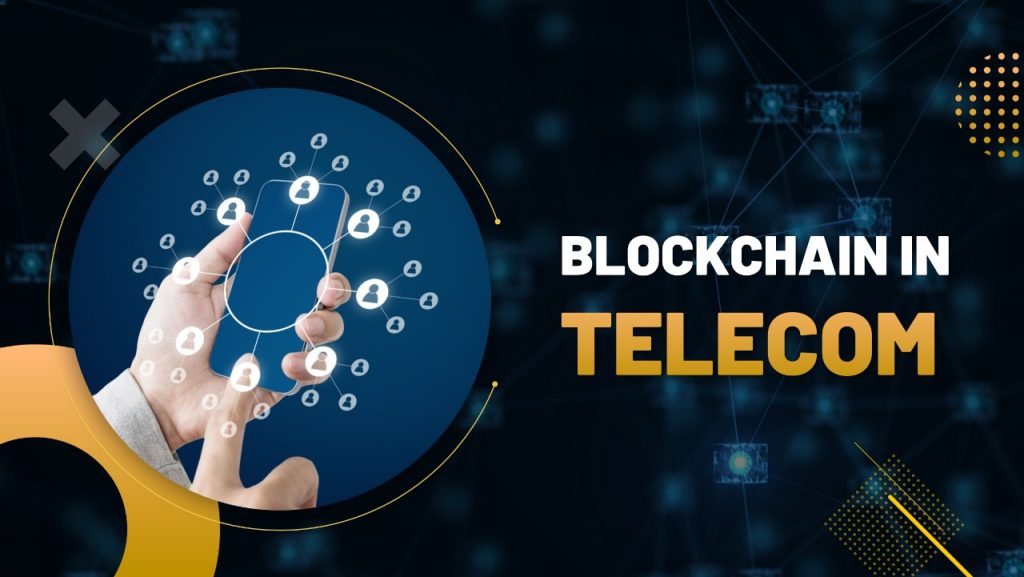Blockchain arguably at present is the most talked-about technology. Blockchain is being explored by all major industries, including the telecom sector, to determine its benefits and how to apply it to its operations. For the telecom sector, blockchain’s value lies in its security, transparency, the immutability of data, and control that it provides at every point of transaction across the ecosystem.
Blockchain, arguably at present, is the most talked-about technology. Blockchain is being explored by all major industries, including the telecom sector, to determine its benefits and how to apply it to its operations. For the telecom sector, blockchain’s value lies in its security, transparency, the immutability of data, and control that it provides at every point of transaction across the ecosystem.
In the telecom industry, several problems still exist unresolved such as the struggle with roaming, risk of fraud, privacy issues, high fees and so much more. When it comes to inter-carrier transactions, they use a mix of automated and manual systems which makes the method of doing business together delayed, complicated, and expensive. Many of the current challenges faced by telecom companies can be resolved by blockchain technology.
Throughout this article, we will explore how blockchain could benefit the Telecom Industry and how it could compensate for existing deficiencies. We will also be going through the use cases of Blockchain in the telecom industry. As we examine these use cases, we will gain a better understanding of how Blockchain could transform the telecom industry and take it to the next level.
Benefits of Blockchain in Telecom
The telecom sector is suffering from several shortcomings. Blockchain can benefit the telecom industry in overcoming these shortcomings. Some of the most notable benefits are:
Boost in Security Measures
Cyber security attacks have become a common phenomenon in every industry and the telecommunication industry is not immune to them either. Every year, billions of dollars worth of fraud take place in the telecom Industry. With the arrival of ‘5G’ and ‘IoT’ technologies, the telecom sector would become more vulnerable to attack as more entry points of attack will be created. Hence, we have reached an inflection point in the telecommunications sector, where robust security mechanisms are more important than ever.
Blockchain will provide a much-needed security boost to telecom companies to fend off the current and potential security threats. Currently, telecom companies are relying on traditional systems of security and centralized databases to preserve data. These practices are no longer effective anymore and criminals have figured out several ways to circumvent the obstacles put forward by the traditional practices of the company. Blockchain with the help of its cryptographic security and decentralized storage of data will make telecom more secure.
Reduction of Costs
Telecom companies in this ever-increasing competition are constantly looking for ways to curb their costs. However, the traditional operational business model is proving to be of no help. The processes such as billing, roaming, and supply-chain management between participants involve tons of intermediaries who are still relying on more manual extensive practices rather than automation. This also makes this process less transparent and inconsistent.
Blockchain by leveraging the feature of smart contracts can help achieve automation of internal processes of telecom companies. There are various clerical and routine tasks involved in the business of telecom providers and smart contracts can take care of all these and streamline the internal process. Enabling smart contracts would help telecom companies to efficiently use their manpower and achieve transparency and consistency.
Collaboration among various stakeholders
The competition in the telecom industry is getting fiercer day by day. Telecom companies aim to create an entire ecosystem and deliver end-to-end services to stay ahead of the competition. However, building such an ecosystem is a complex process that includes building and maintaining a multi-threaded supply chain involving various stakeholders. To achieve that level of efficiency, communication between the various stakeholders involved in the chain of management is essential, and the current centralized operational structure of the telecom companies is the biggest roadblock. Presently, all the data are being siloed in centralized databases and the distribution of this data makes the operations of telecom companies time-consuming, inefficient, and leaves consumers frustrated.
Blockchain, by using its decentralized digital ledgers can help telecommunication businesses coordinate multiple professional relationships with service providers and B2B customers. Furthermore, with blockchain, every stakeholder would get a real-time update of the extent of data useful in the functioning of their operations. This would help telecom companies quickly complete their operations, which previously used to take a significant amount of time, and will result in increased consumer satisfaction.

Blockchain for Telecom: Use Cases
Here are a few major use cases that could utilize the potential of blockchain technology and make the telecom industry more transparent, reliable, and accountable.
Upgrading Roaming Services
Roaming is an important service component for telecom companies, but it is no longer as profitable as it once was. It is facing a lot of challenges, such as the involvement of unnecessary intermediaries like clearinghouses, delays in switching service providers, obsolete security, rising frauds, and increased consumer costs.
Blockchain can make this process much simpler and life easier for the consumer by deploying smart contracts.
SLA agreement
SLAs (Service Level Agreements) are crucial to the telecoms sector. It includes a description of the services to be provided, expected service quality, duties, responsibilities of parties, etc. These SLAs are still very much dominated by inefficient manual processes and as a result, cause vendor disputes and delays in settlements due to differences in interpretation of these agreements.
Blockchain-powered smart contracts can help limit such issues by offering automation and transparency in the process. Furthermore, the end-users will get real-time updates.
Mobile phone theft
The theft of a smartphone entails not only a financial burden: Even more serious is the loss of valuable data stored in it. This theft of data can lead to the threat of identity theft and for people using corporate phones, serious security breaches of their companies. The traditional methods to stop the thief from using the data on the smartphone, are outdated and not effective anymore.
Blockchain can help block a stolen or lost device instantaneously not only on the original telecom service provider but on other providers as well.
Mobile number portability
Though mobile number portability services have been around for several years, their methods and processes are still inefficient. The disconnect between the networks and the fragmented flow of customer information between different providers makes this process difficult, full of delays, and leaves customers frustrated.
Blockchain can accelerate the process, by acting as one network for all providers to access the same information. The blockchain will remove the single point of failure and MNP will be done quickly.
Identity Management
At the time of registering a new account with a telecoms company, the customer is required to share and upload identity documents such as a passport or driver’s license for the process of KYC. These documents are handled by third parties, which makes them prone to fraud or hacking.
Blockchain can allow for decentralized storage of these documents and handing control back to the customer by enabling an identity-as-a-service solution. The immutable record keeping will also reduce instances of forgery and curb fraudulent practices.
IoT
Within the next decade, there will be billions of IoT cellular connections. With IoT connections growing exponentially over time, data insecurity will increase simultaneously as — IoT devices will potentially create multiple entry points for the attack on the entire network if not appropriately patched. In this case, Blockchain provides the ideal solution for enhancing the network’s security by leveraging the cryptographic security mechanism of blockchain.
Data Privacy & Monetization
Data privacy has been a trending issue for some time now. Awareness among consumers as well as regulators has been increasing about the significance of consumer data. This means that traditional practices can’t be followed anymore for data collection from consumers. Blockchain can evolve these practices by offering much-needed data privacy as well as providing monetization to consumers for sharing their precious data.
Micropayments
To make a complete ecosystem of services, many telecom companies are either exploring or have already started offering wallet services. These wallets enable micropayments for OTT services such as music, mobile games, etc. Blockchain can add another dimension to these micropayments by making them secure, peer-to-peer, and less costly for telecom providers by eliminating intermediaries.
Blockchain and 5G
With the emergence of 5G, telecom companies will need to handle versatile access nodes and diverse access mechanisms. Choosing the fastest access node for every user will soon become a major challenge for telecom companies. In addition, the service providers will face several other challenges as the current telecom infrastructure is not competent enough to handle the 5G network smoothly.
The use of blockchain will solve the problems of existing telecom infrastructure like security measures, insufficient automation, overemphasis on centralization, etc. Blockchain will ensure decentralization and faster value functions and 5G will provide infrastructure for machine-to-machine communication.
Supply chain management
As we’re progressing towards the age of IoT devices and 5G, the telecom companies’ network is getting more complex. Add Blockchain can enhance the supply chain management process by employing smart contracts, automating most of the process, and rendering transparency simultaneously.
Final Thoughts
Blockchain has a lot to offer and is ready to deliver results and transform the telecom industry for good. To counter the significant challenges this industry is facing, it is essential to bring a change and improve the quality of telecom services currently being given out. With proper strategy, architecture and implementation, blockchain technology can be the savior of the telecom industry.
The use of blockchain in telecom is still in its infancy today but within the next few years, it won’t be surprising to see blockchain become an integral part of the telecom sector.
Zeeve
Zeeve is the leading Blockchain as a Service platform helping enterprises and Blockchain startups build, deploy and manage reliable decentralized apps and Blockchain networks. Zeeve is a low code automation platform that is cloud agnostic and supports multiple Blockchain protocols with advance analytics and monitoring of nodes and networks. The platform features a powerful set of APIs to build DApps for plethora of use cases across industries. We have experience of more than 5 years designing enterprise Blockchain solutions across domains. Zeeve supports telecom space with Blockchain based Enterprise solutions, decentralized storage, trusted nodes and smart contracts. For more details, schedule a free call with our Blockchain specialist.




